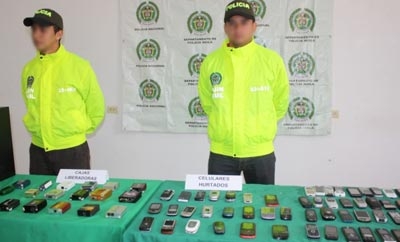Authorities in Colombia have dismantled a sophisticated criminal operation dedicated to the international export of stolen cell phones, showing how innovative criminals can turn common street crime into a lucrative transnational business.
According to prosecutors, the gang obtained stolen cell phones from cities around Colombia before mailing them to countries where they could fetch a higher price, such as Argentina, Ecuador, Peru and Venezuela, reported El Espectador.
Each phone was sold for approximately $30 to $250, investigators said.
The group allegedly used the services of corrupt phone company operatives, who wiped details of the stolen phones off the company data bases.
Fifteen people have been charged with receiving stolen goods, criminal conspiracy, and cell phone tampering, and are currently being held in detention.
InSight Crime Analysis
Cell phone theft is one of the most common street crimes around the world. However, the operation in Colombia is an example of how criminals have begun to take the crime to the next level by fencing the stolen goods internationally.
To carry this out successfully not only required contacts within the cell phone companies but also a broad international network for resale. The number of people needed to make such an operation viable suggests there would have to a large number of stolen phones involved, in order to make the network sufficiently profitable.
Governments are increasingly aware of the problems posed by the international trafficking of stolen phones. In 2012, the United States and Mexico signed an agreement targeting the cross-border resale of stolen phones and other mobile technologies, such as tablet computers, by blocking reactivation of the devices in both countries.
Shortly before the agreement was signed, government representatives from the United States, Turkey, Spain, Ecuador, Mexico, Costa Rica, El Salvador, Paraguay, Uruguay, Chile, and Colombia met to discuss how to better cooperate in monitoring stolen phones that move across borders.

